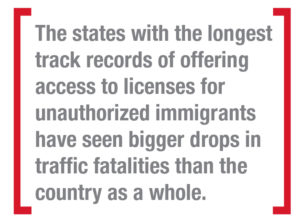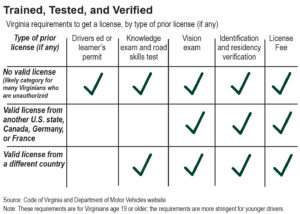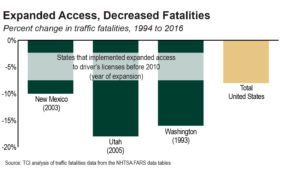January 17, 2018
Hands on the Wheel
Improving safety and boosting communities through removing barriers to driver’s licenses

Virginians are safer when more of the drivers on our roads are trained, tested, licensed, and insured. That’s why Virginia has such strong education and training requirements for new drivers. And our communities and economy are stronger when more residents are able to participate in everyday life without breaking the rules of the road by driving without a license. Twelve states and the District of Columbia already allow unauthorized immigrants to obtain some form of driver’s card. Expanding access to driver’s licenses for unauthorized immigrants would increase safety and help Virginia’s economy and communities.
Safety First
The facts don’t support the concern that providing driver’s licenses to unauthorized immigrants will lead to an increase in traffic accidents. Road safety has improved in the U.S. in the last two decades since some states have started authorizing licenses for unauthorized immigrants. And the states with the longest track records of offering access to licenses for unauthorized immigrants have seen bigger drops in traffic fatalities than the country as a whole. Since 1994, the early adopter states have all seen greater than 10 percent drops in traffic fatalities, compared to an 8 percent national decrease.
One reason for these safety improvements in early adopter states may be that a greater share of drivers have undergone the training and testing required to get a license.
Virginia law requires that new driver’s license applicants who are under the age of 19 complete a state-approved driver’s education program, including classroom and on-the-road experience. Those over age 19 who don’t have a valid license from any state or country must (1) show proof of successful completion of a driver’s education course or hold a learner’s permit for 60 days, and (2) pass a two-part knowledge exam and road skills test. Applicants age 19 or older who have a valid license from a country other than the U.S., Canada, Germany, or France must pass a two-part knowledge exam and road skills test. All must pass a vision screening.
All this testing and training helps build knowledge of the road rules and proper driving techniques.
Another safety advantage is that licensed drivers appear to be less likely to leave the scene of an accident, so expanding access to driver’s licenses may reduce the rate of hit-and-run accidents.
Almost by definition, it is difficult to get data on the drivers involved in hit-and-run accidents, but a study by AAA of crashes from 2001 to 2005 found that 41 percent of hit-and-run drivers whose license status could eventually be determined had an invalid license or no license. Of drivers who remained at the scene of a crash, just 11 percent had an invalid license or no license.
Having drivers and witnesses remain at the scene of an accident is important for many reasons, and can be particularly critical when a pedestrian or bicyclist is struck, since the survival of these vulnerable road users may depend on someone immediately calling for medical assistance.
In addition to improving safety, everyone benefits when all vehicles and drivers are insured. One of every 10 Virginia drivers lacked automobile insurance as of 2012, according to estimates based on insurance claims data. Technically, car insurance covers vehicles, not people, but expanding access to licenses may reduce the number of uninsured vehicles, since newly licensed drivers may be more confident, motivated, and able to get proper insurance for their cars. Unlicensed drivers may have difficulty even finding insurers to cover them, since there would be no way for the insurer to verify driving record or ability. Providing access to licenses may remove some of these barriers.
A strong economy and communities also matter
Getting more drivers licensed also improves our communities and economy. Driving is a necessity for most families, not a choice. Expanding access to licenses would help parents get to parent-teacher conferences, families get to church, and workers get to their jobs. The Virginia Department of Motor Vehicles estimates that approximately 308,000 Virginia residents would apply for a driving privilege card within four years of implementation.
Unauthorized immigrants are already a part of Virginia’s economy and communities, with many living in “mixed-status” families with relatives who are lawfully present and U.S. citizens. Access to licenses would not only help the individual unauthorized immigrant, it would also help their relatives and other community members. And many states that have expanded access to driver’s licenses have included requirements – such as showing a history of filing state tax returns – to make sure only established residents of the state are gaining access.
Along with these family and community benefits, there are a number of potential economic benefits from expanding access to driver’s licenses. Newly licensed workers could fill job openings far from public transportation that would otherwise have remained empty. Agricultural employers could see an increase in the share of their workers who are trained, tested, and licensed drivers. And car insurance costs could go down for everyone if there’s increased road safety and decreases in the number of uninsured drivers.
Practical considerations for Virginia
Virginia policymakers who might be considering expanding access to driver’s licenses must consider practical matters as well as the potential impact on road safety, Virginia’s economy, and communities.
It does not appear that expanding access to licenses would have a major fiscal impact. Virginia charges $32 for a regular driver’s license that is valid for eight years, and $10 for a special 90-day temporary driver’s license. The Virginia Department of Motor Vehicles has estimated that an initial fee of $51 for driving privilege cards would generate enough revenue to cover direct costs such as testing and identity verification, as well as start-up costs for any required income tax payment verification system.
In addition, expanding access to driving licenses for unauthorized immigrants can be done while complying with federal requirements for identification documents. Most other states that have expanded driver’s licenses access have complied with these federal requirements.
Conclusion
There are good reasons to deny some people access to driving. Those who have a track record of driving recklessly or under the influence of drugs or alcohol, for example, should not be allowed to endanger everyone else on the road. But the vast majority of unauthorized immigrants who want to participate in the system of testing and licensure are not in this category and should be provided the chance to learn and abide by the rules of Virginia’s roads. Expanding access to driver’s licenses would increase safety and help Virginia’s economy and communities.


